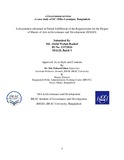| dc.contributor.advisor | Islam, Dr. Md. Zohurul | |
| dc.contributor.author | Rashed, Md. Abdul Wahab | |
| dc.date.accessioned | 2016-02-29T15:57:21Z | |
| dc.date.available | 2016-02-29T15:57:21Z | |
| dc.date.copyright | 2015 | |
| dc.date.issued | 2015 | |
| dc.identifier.other | ID 13372024 | |
| dc.identifier.uri | http://hdl.handle.net/10361/5048 | |
| dc.description | This dissertation is submitted in partial fulfillment of the requirements for the degree of MA in Governance and Development, 2015. | en_US |
| dc.description | Cataloged from PDF version of thesis report. | |
| dc.description | Includes bibliographical references (page 50 - 54). | |
| dc.description.abstract | Bangladesh has made significant strides forward in the field of e-Government Services in the
past decade, starting with somewhat scattered projects on infrastructure development and some
applications for automation of internal processes, but gradually moving towards e-services
delivery and inter-connected governance. From late 1990s till about 2013, the government
undertook a number of e-Government projects, many of which were initiated from the Ministry
of Planning. After 2006, a more consolidated approach to e-Government was undertaken with
increased emphasis on citizen service delivery and transparency.
The Government has introduced e-Service at DC office at district level, Upazila
Information Service Centre at Upazila level and Union information service centre at Union level
to give e-services to the citizen. However, several major challenges still exist, such as lack of
infrastructure, human resources, financial allocation and institutional capacity, Affordable
connectivity, Reliable and continuous power, Full-fledged ICT policy.
Laxmipur District, one of the 64 district of Bangladesh has achieved satisfactory success in
providing e-Service to every level of people in the district but faces some significant barriers to
its further enhancement with respect to the government's capacity. While the government's ICT
infrastructure has improved notably, they are still limited mostly to offices in urban locations and
skill manpower is badly needed. The administrative structure needed for a coordinated approach
to e-Government is also non-existent, the requisite policy and legal framework to enable growth
of e-Government still has some major gaps, with respect to guidelines for data standardization,
shared ICT resources, data security and privacy.
This writing contributes exposing various initiatives, challenges, prospects of e-
Government and e-Services in our country keeping special focus on Laxmipur District .It is seen
that Laxmipur DC Office though new in giving e-Services is doing quite well and is improving
day by day .There is no policy barrier at the moment as steps has been taken to solve the existing
problems by A2i and Government.
In this research I have focused on e-Government, for this I have used survey
strategy to find e-Services and relevant expectations from the citizens of Bangladesh. They have
suggested 101 different e-Services also identified certain areas for improvement. I mainly
emphasized on the required e-Services hence an arranged list of e-Services has been provided
separately in the paper. | en_US |
| dc.description.statementofresponsibility | Md. Abdul Wahab Rashed | |
| dc.format.extent | 63 pages | |
| dc.language.iso | en | en_US |
| dc.publisher | BRAC University | en_US |
| dc.rights | BRAC University dissertation are protected by copyright. They may be viewed from this source for any purpose, but reproduction or distribution in any format is prohibited without written permission. | |
| dc.subject | MAGD | en_US |
| dc.subject | E-government | en_US |
| dc.title | E-government services : a case study of DC office Laxmipur, Bangladesh | en_US |
| dc.type | Thesis | en_US |
| dc.contributor.department | BRAC Institute of Governance and Development, BRAC University | |
| dc.description.degree | M. Governance and Development | |

